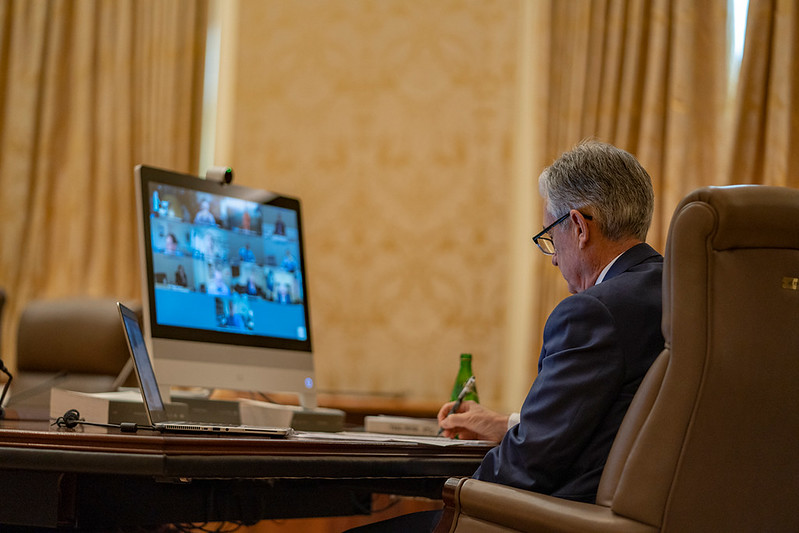No one now doubts that inflation is a very big problem in the United States. Federal Reserve Chairman Jerome Powell admitted that the Fed’s hope during the reopening of the country after the Corona shutdown, was misplaced. “We were expecting inflation to peak at this time and decline over the rest of the year,” he said. But his expectations did not hit the target. An interest rate increase of half a percentage point will be “on the table” when the Council meets on May 3-4.
In March, consumer prices (or inflation) were 8.5 percent higher than the previous year, the fastest annual rise since 1981.
The Fed had resisted raising interest rates until 2021 even though inflation was well above its long-term target under the policy adopted in late 2020. It said it would be content to allow inflation to become more elevated than usual in order to achieve full employment.
But inflation was not “temporary” as Powell and Federal Reserve officials had insisted, saying it will dissipate as factors linked to the Covid epidemic such as supply chain blockages and inflated demand for goods for services recede.
These forecasts were “disappointing” and “the Fed should change course,” Powell said in a discussion on the global economy at IMF meetings.
Commenting on Powell’s speech, Allianz Chief Economist Mohamed El-Erian wrote on Twitter: “After being left behind, the Federal Reserve has finally recognized the gravity of the inflation challenge and the need to act decisively and in a timely manner. Let’s hope he has the skill, time and luck to provide de-inflation in a way that does not harm growth, jobs and well-being.”
“Why the Fed made a historic mistake about inflation”
In an article titled “Why the Federal Reserve Made a Historic Mistake on Inflation”, The Economist says that the Fed “has the tools to stop inflation and failed to use them in time. The result is the worst case of economic letdown in a large and rich economy over a 30-year history of central banks fighting inflation.
The good news is that inflation may finally have peaked. But the Fed’s 2 percent target will remain elusive — forcing painful choices on the central bank.
Advocates of America’s policymakers point to a 7.5 percent annual price hike in the region. The euro and 7% inflation in Britain serve as evidence of a global problem, driven by high commodity prices, especially since the Russian invasion of Ukraine.
It is appropriate to move quickly
During the IMF meetings, Powell said that with inflation being at triple the Fed’s target, “it would be appropriate to move a little faster…50bps will be on the table in the May meeting”.
Powell’s comments coincide with market expectations that the Fed will move away from its usual 25bp increases and move more quickly to tame inflation that is running at its fastest pace in more than 40 years.
Dealers in contracts linked to the overnight federal funds rate now expect the Fed to raise it to a range of 2.75 percent to 3 percent by the end of the year, a pace that would involve half-point increases in three future meetings, and increases of one quarter of a point in the other three sessions of the year.
Powell feels that investors who are now anticipating a series of half-point increases are “generally proportionately reacting” to the board’s emerging battle against rising prices.
Really committed to using our tools to reduce inflation
“We are really committed to using our tools to bring down inflation,” Powell said, acknowledging that the Fed’s hope for that, during the reopening after the coronavirus shutdown, has been misplaced so far – to the point that the Fed, for example, no longer counts on help from improving global supply chains.
“Maybe the actual [inflation] peak was in March, but we don’t know that, so we are not going to rely on it. we will really raise rates and quickly get to more neutral levels and then really tighten from there … if that’s appropriate once we get there,” he added.
He continued, “We were expecting inflation to peak at this time and decline over the rest of the year, and then more… These expectations proved disappointing in the past. We want to see real progress… We will not rely on help from oversupply. We will raise interest rates and quickly reach more neutral levels, and then we will raise it further if necessary.”
Reducing bond purchases soon
Besides raising interest rates, the Federal Reserve is expected to soon start reducing the amount of bonds it is holding. The central bank’s balance sheet now stands at nearly $9 trillion, consisting primarily of Treasury bills and mortgage-backed securities.
Discussions at the March meeting indicated that the Fed would eventually allow a cut of $95 billion in bond yields maturing each month.
Powell noted that other than “malignant inflation”, the US economy is “very strong”. He described the labor market as “historically very narrow”.
He referred to former Federal Reserve Chairman Paul Volcker, who fought inflation in the late 1970s and early 1980s with a series of price increases that eventually led to the recession. “Volcker knew that in order to tame inflation and heal the economy, he had to stay the course,” he said.
In the end, Volcker raised the benchmark interest rate to nearly 20 percent, while it currently falls in the range between 0.25 percent and 0.50 percent.








